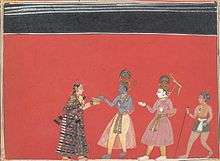Kubja
Kubja is a hunchbacked woman from Mathura, who the Hindu god Krishna is described to have rescued and made beautiful.

The episode is described in the Bhagavata Purana and the Sur sagar by Surdas. Modern-day sermons as well as the Television series Krishna by Ramanand Sagar recalls the episode.[1]
Background
The Bhagavata Purana narrates that after meeting his friend Sudama, Krishna and his elder brother Balarama walked through the streets of Mathura and encountered Kubja, a young hunchback maidservant of the king Kamsa. She had a beautiful face and carried a plate of ointment with her. Krishna praises her beauty and asks for ointment in return for a boon. She introduces herself as Trivakra, one who is bent in three places. Mesmerized by Krishna's charm, she grants him the ointment that she was taking for the king. Pleased, Krishna presses his toes on her feet and placed a finger of both his hands under her chin and raises the fingers, which straightened her body. Kubja turns in a beautiful woman with perfect hips and breasts. Kubja gets overcome with desire for her saviour and pulls the upper garment of Krishna, inviting him to her house. However, Krishna politely declines and promises to return to her house, after fulfilling the purpose of his visit.[2][3]
In Ramanand Sagar's series, Krishna meets the bent and ugly Kubja, who carries sandalwood paste for the king. Krishna flatters her in a boyish prank tone. The ugly Kubja becomes upset and fells insulted, considering it a sarcastic taunt. However, Krishna explains to her that he was not referring to her physical state but to her inner beauty of the soul and prophesies that the curse of her physical deformity will soon disappear. Krishna asks her to give him the sandalwood paste, which he will deliver it to Kamsa. Kubja is suspicious of Krishna's intention, but slowly begins to trust him. Kubja fears that Kamsa may behead her if she grants Krishna the paste, but Krishna comforts her that he will protect her from the tyrant. She slowly realizes the divine nature of Krishna and is filled with devotion. She comments how she is waiting for him for several lives and the paste was meant for him, ultimately offering the paste as a mark of complete surrender. In sermons, Kubja offers the ointment even without being asked as a gesture of any devotion.[4] After straightening Kubja, she bows to Krishna. There is no hint of erotic overtones to Kubja episode in the television series. Kubja applies the paste on Krishna's feet as a mark of respect as he takes her leave.[5]
Surdas's poetry mentions the episode in a passing reference, however the focus in the text is the saving grace of God, who does not discriminate in devotees and helps even a low class maidservant Kubja.[6] In the Bhagavata Purana, after slaying Kamsa, Krishna visits Kubja with Uddhava as promised. Kubja worships Krishna with her companions and offers him a seat of honour. As Kubja readied herself for Krishna, Krishna made himself comfortable in Kubja's bed in the inner chambers. As she shyly approached Krishna, he pulls her in bed and consummates the relationship, fulfilling his promise. By embracing him, Kubja's desire is fulfilled. She requests Krishna to stay with her for some time, however Krishna left for Uddhava's residence, promising he will fulfil her desires again.[7][8]
Surdas talks about the second meeting of Kubja and Krishna in more detail. He mentions that Kubja's fortune is due to her virtue in a previous life. After killing Kamsa, Krishna hurries to Kubja's house to fulfil her desire.[9]
In the Brahma Vaivarta Purana, Kubja is the reincarnation of Shurpanakha, a demoness who vied for Rama, Krishna's previous birth on earth. Surpanaka's penance is rewarded in her birth as Kubja, when her desire to unite with Rama is fulfilled.[10]
The television series as well as other classical works like the Vishnu Purana do not record the visit of Krishna to Kubja's house.[11]
In popular culture
The story of Kubja appears in the beginning and the end of the 2019 film Bala, in the form of a school theatre.[12] The reference is made in relation to an underlying theme of colorism in the film.
Notes
- Pauwels p. 330
- Bhagavata Purana 10.42 by Prabhupada
- Pauwels pp. 331-2
- Pauwels p. 331-2
- Pauwels pp. 335-7
- Pauwels pp. 330, 332
- Pauwels pp. 333-4
- Bhagavata Purana 10.48 by Prabhupada
- Pauwels p. 335
- Pauwels pp. 336
- Pauwels p. 337
- News 18. If You Criticise Directly, People will Not Listen, Says Bala Director Amar Kaushik 26 November 2019.
References
- Heidi R.M. Pauwels (11 September 2008). "The Threat of the Other Woman: Free-Spirited Surpanaka and Sosphisticated Kubja". The Goddess as Role Model. Oxford University Press. ISBN 978-0-19-970857-4.